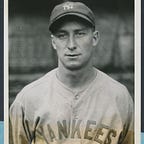Monday, June 6, 1927: New York City
Bowling On Long Island: “Nine Pins to Eight”
 Saturday’s game was rained out, so we had the full day off, even though the weather turned out to be perfect.
Saturday’s game was rained out, so we had the full day off, even though the weather turned out to be perfect.
The downpour had started on Friday evening and had gone all night, so Saturday morning everyone knew that even if it stopped raining before noon, the game would be called because of wet grounds.
Hoyt called me at 9:00 a.m. and asked if Steven and I wanted to go out to Long Island to a big blow that was being hosted Saturday night by Harry Frazee. Frazee is a wildly successful theatrical producer who scored a huge financial hit in ’25 on Broadway and in London with “No, No, Nanette.” He’s not up there with the likes of Gershwin, Irving Berlin, Ziegfeld or Barrymore — he’s hardly worthy of being grouped with those giants of the Great White Way — but he is a legitimate success.
He’s also the man that sold Babe Ruth to the Yankees back in January of 1920.
No man is hated more in Boston than Harry Frazee, and with good reason. After he sold Ruth to get the money he needed to produce “Nanette,” Frazee gutted the Red Sox for even more cash. In Ruth’s wake, he sold or traded almost all of their best ballplayers one by one, some at bargain prices, to his friend Colonel Jacob Ruppert, the owner of the Yankees. Following Ruth to New York were Hoyt, Dugan, Pennock, and Pipgras. And those are just the boys still on our team! Frazee also sold the Yankees Carl Mays — a complete bastard, but a great pitcher — and a handful of other players.
Since Ruth arrived in New York in 1920 the Yankees have won four American League pennants, while the Red Sox — World Series champions with Ruth in 1915, ’16 and ’18 — have finished in the second division every year and have become the worst team in the American League.
Hoyt and Frazee are a strange pair, especially because Hoyt hated Frazee when he was on the Red Sox, as did most of the players and most of their fans. But their relationship changed during the 1921 World Series, the Yankees’ first.
The Yanks opponents in the ’21 Series were the New York Giants, who under their manager, John McGraw (the “Little Napoleon”), were as vicious a bunch of bench jockeys as baseball has ever seen or heard. Right away, from the first pitch of the first game, McGraw’s men were riding Ruth mercilessly, calling him “N*gg*r Lips” and “Big Baboon” every time he came to bat. McGraw and his boys are among the bunch that enjoy spreading the rumor that Ruth’s got black blood in him.
It got so ugly that after that first game, Ruth and Silent Bob Meusel stormed into the Giants’ locker room and challenged the entire team to a fight. Nobody took them up on it.
Later in the series, the Giants turned their attention to other players, including Hoyt. McGraw has hated Hoyt ever since Schoolboy first told the Little Napoleon to go screw himself back when Hoyt was just 15 and felt McGraw was jerking him around about signing him to his first contract. After he signed him, McGraw did crazy, petty stuff, like order Schoolboy to hide in a corner of the dugout and heckle and harass umpires for him. No wonder Hoyt can’t stand him.
Six years later in ’21, McGraw, still inflamed by their grudge, instructed his team to viciously heckle the young Hoyt, sure that he could unnerve him. In game five of the Series, in the bottom of the first inning, the Giants’ first batter, George Burns, reached base on an error and later scored. As Burns crossed the plate, someone from the Giants’ dugout called Hoyt a “stage boy f*ggot.”
As he walked off the mound having given up just one run, Hoyt didn’t go directly back to the Yankees’ bench. Instead, he first walked out to the bullpen in left field. When he returned to the dugout on the third base side, he sat down alone, away from the rest of the team, his hands in his jacket pockets, ignoring what was happening on the field and silently staring at the Giants dugout and McGraw. While the Yankees batted, Sailor Bob Shawkey, an 18-game winner that year, came over and sat beside Hoyt, looking to calm him down. Sailor Bob talked to Hoyt about the need to ignore the Giants and, especially, McGraw, to only think about each batter he was facing, one at a time. As Schoolboy went out to pitch the top of the second, he thanked Sailor and told him he truly treasured his advice.
Back on the mound, Hoyt was about to take his warm-up pitches when the Giants dugout again erupted in a torrent of slurs, most of them questioning Hoyt’s sexual preferences. Staring straight at his catcher, Wally Schang, who was crouched behind the plate expecting the ball, Schoolboy pulled out of his back pocket a sizeable rock that he had fetched on his trip to the bullpen after the top of the first. Then he whirled as if he were picking off a runner on first base and fired the stone into the Giants dugout with all his might, and with a stunning level of accuracy. It crashed against the wall only about a foot from the Little Napoleon’s head, making a sound like a rifle shot. McGraw’s dugout was much more restrained after that, as were the Giants’ bats — Hoyt held them scoreless the rest of the contest, on his way to winning his second game of the series.
That night, Schoolboy was out at Texas Guinan and the mobster Larry Fay’s first big speakeasy, the “300 Club,” when he ran into Frazee. The Red Sox owner told Hoyt that he had been at the the game, sitting near Colonel Ruppert in a box behind the Yankee dugout, which gave him a wonderful view of Hoyt’s rock throw. Like almost everyone in baseball who’s not a New York Giant, Frazee hates McGraw, and he told Ruppert he should give Hoyt a $100 bonus right after the game, and that he should raise it to $500 if the Yankees won the series. Upon hearing this story, Hoyt thanked Frazee for the hundred dollars, which a messenger from Ruppert’s office had delivered to him along with a note, shortly after the last out. He also thanked Frazee for trading him to the Yankees and reuniting him with Babe Ruth.
Since then, they’ve been on good terms.
 Early Saturday morning, when it looked like the skies would clear but it was obvious the Stadium grounds would be too wet to play, Frazee called Hoyt and invited him to drive out to an estate he’s renting in Great Neck, Long Island, for an afternoon of tennis and an evening of madness at a blow he was having to start the summer. Schoolboy, in turn, invited Steven and me to join him. Stanwyck, who’s heading back to the Broadway stage in a new show in September but had never met Frazee, came along to round out our foursome.
Early Saturday morning, when it looked like the skies would clear but it was obvious the Stadium grounds would be too wet to play, Frazee called Hoyt and invited him to drive out to an estate he’s renting in Great Neck, Long Island, for an afternoon of tennis and an evening of madness at a blow he was having to start the summer. Schoolboy, in turn, invited Steven and me to join him. Stanwyck, who’s heading back to the Broadway stage in a new show in September but had never met Frazee, came along to round out our foursome.
It took us only about 45 minutes to drive to Great Neck, and about five of those were spent motoring up the estate’s winding driveway, past orchards and stables. Most of the ballplayers I’ve played with come from towns that take less time to drive through than Frazee’s summer estate.
Hoyt, Steven and I were expecting to play a friendly game of doubles, with one of us having to prop up Frazee, but when we got there Frazee announced that he was only going to be a spectator and that Steven’s partner would be one of his house guests for the weekend, Harold Lloyd. The comedian’s been in New York since May planning his next movie, which he told us is about a taxi cab driver.
Lloyd is a terrific athlete, which you can tell from his films. What you can’t tell is that back in 1919 he had his thumb and part of his index finger on his right hand blown off when he didn’t realize that a bomb prop he was holding was actually a live bomb. He plays tennis lefty now, and you would never guess he hadn’t always been a southpaw. Between changeovers, Lloyd was jumping back and forth over the net and taking pratfalls. His acrobatics were matched by Stanwyck’s, who after each of our first few games did cartwheels across the court in a successful attempt to distract us. Midway through our first set and her second martini, Stanwyck grew tired of that and asked our host if he could give her a tour of the house. Mr. Frazee enthusiastically obliged her.
Harold and Steven were a surprisingly good pair — Lloyd’s lefty serve was particularly troublesome for us — but Schoolboy and I tired them out and beat them 9–7, 6–3. Afterward, Steven excused himself saying he had to make a business call, and Hoyt, Lloyd and I went upstairs onto a marble veranda overlooking the pool and the sailboats out on the Sound to have some lunch and our first drinks of the day.
Lloyd told us all about his picture, how he planned to shoot a series of crazy taxi rides all over the city, one block at a time — but make it look on the screen like one long, insane cab ride — and how he was also going to shoot on the subways, and out in Coney Island, and end the movie by stealing a street car and driving it wildly with a team of horses through the heart of the city, all to win the heart of a girl. The way he told the story and described the scenes, I could see the movie in my mind, as if I’d already seen it in the theater. Lloyd is a magical storyteller.
 A few sips into our third gins, the three of us decided to explore the house and try to find Stanwyck and Frazee. One of the many servants scurrying about the marble floors that run inside and outside the house said they had gone downstairs to the bowling alley.
A few sips into our third gins, the three of us decided to explore the house and try to find Stanwyck and Frazee. One of the many servants scurrying about the marble floors that run inside and outside the house said they had gone downstairs to the bowling alley.
The marble stairway we took down to the basement flowed into an enormous passageway that branched off in two directions. Painted on the wall in front of us were a series of suns and moons, with the suns floating in one direction and the moons floating in another.
“Eeny, meeny, miny, moe,” said Lloyd.
“Catch a tiger by the toe.
If he hollers, let him go,
Eeny, meeny, miny, moe!”
“Well, that settles it,” said Hoyt. “We shall follow the sun, lads.”
And so we headed down Frazee’s boulevard of a basement, opening door after door on both sides, each one a storage room filled with cases of wine, Champagne, whiskey and gin.
“Pardon me,” said Lloyd to a crate of Champagne, “you wouldn’t have any beer in here, would you?” The Champagne ignored him.
We turned a corner and saw that the hallway of suns continued straight back another hundred feet at least, almost the length of a city block. We walked down this new leg of the subterranean marble hall — Hoyt and I carrying newly opened bottles of French Champagne, Lloyd choosing a French merlot — until we came to a large double door, framed by rose bushes and vines.
We entered an unoccupied ballroom filled with roulette wheels, gambling tables, well stocked bars, chandeliers, and in the rear a lounge with a stage facing a double-tier of banquets. Seated in one of the banquets were Steven and two other men. As we made our way over to them, I recognized one of them right away — Charles Stoneham, the owner of the Giants baseball team. The other man I vaguely recognized but couldn’t pin a name to his face.
Steven and Stoneham looked surprised to see us. The third man was writing in a small notebook and didn’t see any need to acknowledge our presence.
“Sorry, gentlemen,” said Hoyt. “We’re looking for the bowling alley.”
“Quite alright,” said Steven, forgiving our interruption and treating us as if we were strangers — or worse, hired help who need not be introduced to his companions, and were expected to quickly find their way out.
Schoolboy, Lloyd and I left Steven and his companions in the empty casino. On his way out, Lloyd loudly spun every one of the roulette wheels that he passed. In the hallway, as we began our long walk, back past the suns and toward the moons, I wondered out loud, “What was Steven doing with Charles Stoneham? And who was that other man?”
“Charles Stoneham,” said Lloyd, “is a swindler, a thief and a wicked gambler. And those are his good qualities. I would expect him to be in a room like that, but not when it’s empty.”
“And that other man,” said Hoyt, “is the biggest bankroll in New York, and the man who fixed the 1919 World Series.”
“That’s Arnold Rothstein? Are you sure?” asked Lloyd.
“Oh, yes,” Schoolboy replied. “Quite.”
Perhaps if it had just been Hoyt and me, we would have tried to figure out what we had just seen, but with Lloyd in the mix — a swell guy, but still an unknown to us — the conversation went no further.
Eventually we made it to the other end of the the passageway, where we found a second set of double doors. Expecting to find the bowling alley, we instead discovered a loading dock the size of the Yankee locker room, with wooden flooring and walls, and a great deal of heavy equipment for unloading and moving cases of wine, Champagne, whiskey, gin and God knows what else. At the far end of the wooden room was a wall that was actually a large metal garage door, wide enough for 10 cars to come through. It took a few minutes but Hoyt finally found the switch, and the wall opened onto the Sound and a pair of dark green piers.
We walked out onto a pier and could see that we were about a hundred yards off to the side of the main house, away from the public dock and not visible to the guests of the estate.
“My, my,” said Lloyd, with a great deal of admiration. “It’s pretty clear how the owners pay their mortgage.”
On our way back upstairs Lloyd noticed a door we had missed, directly behind the marble stairs that first had led us down to the basement.
Lloyd opened it and said, “I believe that by the rules of exploration, we now have to refer to this as the Harold Lloyd bowling alley.”
 “Actually,” said a most lovely voice, “by those rules, it’s the Stanwyck.”
“Actually,” said a most lovely voice, “by those rules, it’s the Stanwyck.”
Stanwyck, who had driven out with us wearing khaki riding jodhpurs — which since this spring she’s taken to wearing even on days when she has no plans to be anywhere near a horse — was now wearing only her underpants and her riding shirt. She was sitting at a bar located beside the lane, nursing a martini in a long stemmed glass.
“We’ve been playing strip bowling. You’re just about to see Harry lose,” she said jumping down from her bar stool.
Seated on a bench alone, looking like someone who thought he was in for an intimate show, only to find out that he had become the intimate show, was Harry Frazee, stripped down to his boxers.
“Her first two throws went into the gutter,” Frazee sighed, offering the beginnings of an excuse for how he found himself in this predicament.
“And that,” explained Stanwyck, “is when Harry, here, let his mind go into the gutter and suggested that it would be a swell idea if we played strip bowling.”
Stanwyck called down to the far end of the alley, “Set ’em up again, please, Wendell!” A servant who was clearly enjoying his job very much this afternoon, reset the pins.
“Just before you came in,” she continued, “I was explaining to Harry, who thought I was from Kansas — you did guess Kansas, right, Harry? Yes, Kansas, a state with only a few bowling alleys, we both agreed — I was explaining to Harry that, actually, I was born and grew up in Brooklyn, which is basically the home of bowling! And I was telling Harry how I used to go bowling all the time when I was a little girl. I mean, gosh, Tommy,” she said winking at me, “I just love bowling!”
Each time she said the word “bowling” — like a little girl saying “Christmas!” — Frazee’s boxers lost a little bit more of their grip on his waist.
“Thank you, Wendell!”
And with that she pirouetted and tossed the ball gracefully down the lane. Everyone in the room except Frazee was silently praying the ball would stay true to its course.
It left one pin standing.
“Oh, Harry! That’s another frame you’ve lost — nine pins to eight.”
All eyes turned to Frazee.
To his credit, he was not going to welsh on his bet. To her credit, Stanwyck told him he should pay up later when there was less of a crowd.
With that we all headed upstairs to change for the party.
 Soon after the sun went down, the cars began arriving, driving up the long road to the estate, a seemingly endless parade of sedans and convertibles, a conveyor belt of the “Who’s Who” of New York and the summer set from Long Island. Meanwhile, on the other side of the house, the Newport crowd motored in from their yachts on a carousel of water taxis.
Soon after the sun went down, the cars began arriving, driving up the long road to the estate, a seemingly endless parade of sedans and convertibles, a conveyor belt of the “Who’s Who” of New York and the summer set from Long Island. Meanwhile, on the other side of the house, the Newport crowd motored in from their yachts on a carousel of water taxis.
Movie and theater producers, stars of stage and screen, writers, artists, singers, dancers, U.S. senators, mayors, judges, police commissioners, bankers and mobsters. And, of course, their girlfriends. All of them awash in the 18th Amendment.
At 3:00 a.m. Hoyt and I decided we’d best head back to the city to get some sleep before our game against the Tigers. We went looking for Stanwyck but she was nowhere to be seen. As we were walking back to the car about to drive home without her, we stopped and looked at each other.
“My God, we’re idiots!”
We walked back to the house and went straight down the stairs, back to the bowling alley. We opened the door to find Stanwyck in the middle of a sea of bowlers in various stages of undress. Some were fully unclothed.
“Strip bowling, Tommy! I told them it’s all the rage in Kansas!”
- John Barrymore
- Irving Berlin
- George Burns
- Larry Fay
- Harry Frazee
- George Gershwin
- TEXAS Guinan
- WAITE Hoyt
- Harold Lloyd
- John McGraw
- SILENT BOB Meusel
- ARNOLD Rothstein
- Wally Schang
- SAILOR BOB Shawkey
- Barbara STANWYCK
- STEVEN
- Charles Stoneham
- Flo Ziegfeld
- 1927 Yankees
- 1921 World Series
- Baseball Hall of Fame Artifact: Promissory note from Babe Ruth’s sale to the Yankees.
- BROOKLYN DAILY EAGLE, September 5, 1915: “Junior Eagle Pitcher Goes to Giants”
- No, No, Nanette
- Speedy
“Relief”
Wilcy “Cy” Moore, a rookie pitcher, was one of the many breakout stars on the ’27 Yankees. Myles admired Cy not necessarily for his ability to pitch, but for his ability to not think while on the mound, a skill that Myles wishes he had after coming into the June 6 game in relief. Men on 2nd and 3rd, 35,000 screaming fans, the Yankees, the Tigers…all watching Myles deliver his next pitch…
It’s just baseball. Hell, it ain’t as tough as farmin’ or trying to get a mule to do what ya’ needs him to do,” Cy was telling me the other day while we were taking a break from running in the outfield. Cy’s not dumb, honest, but to be fair, there don’t appear to be a lot of ideas competing for space inside his head.
And I think that helps him out on the mound.
